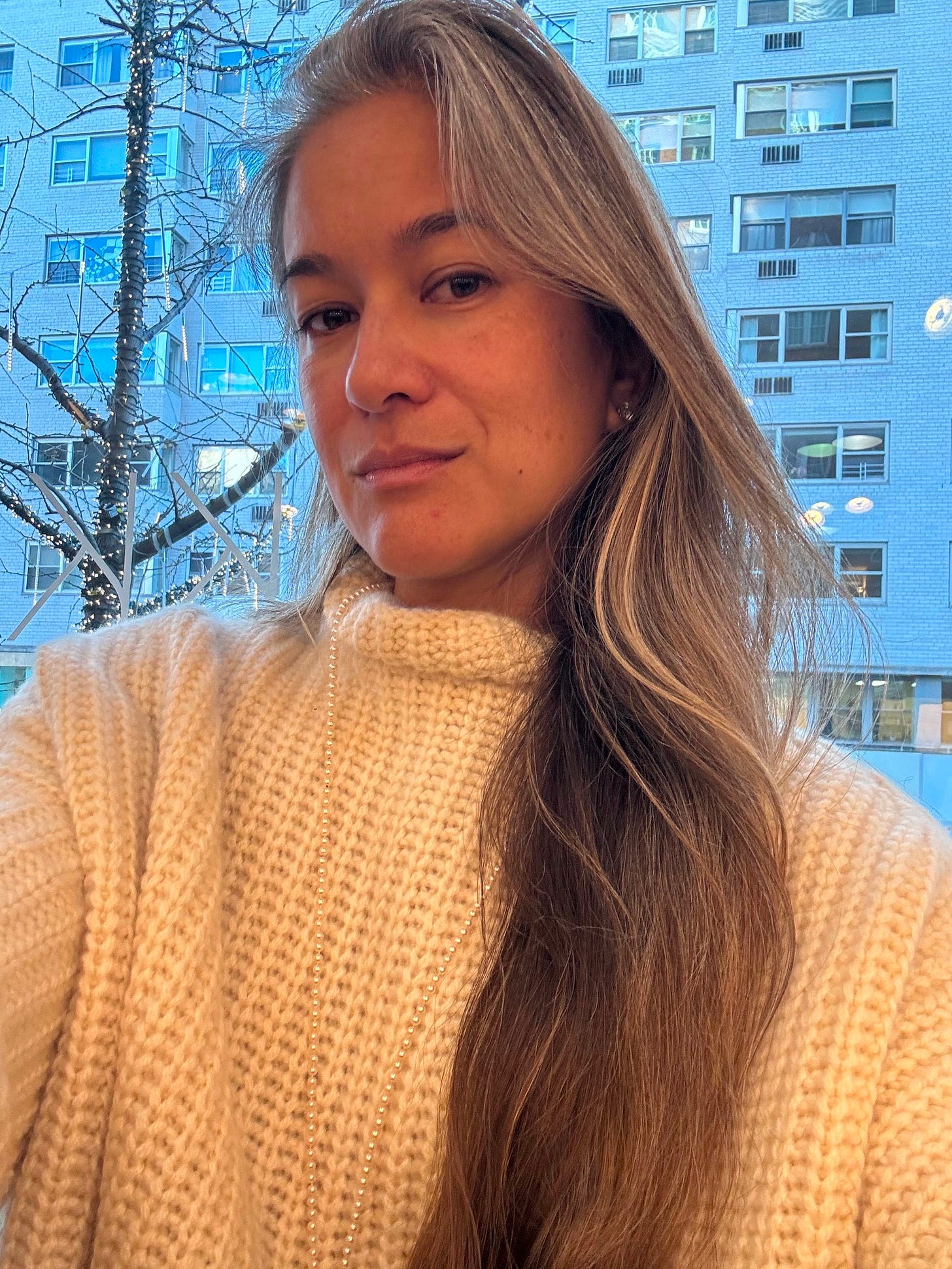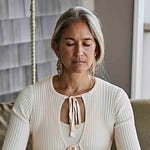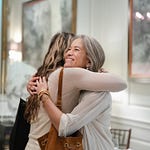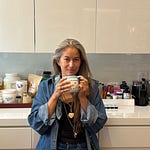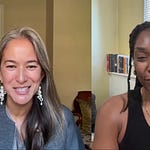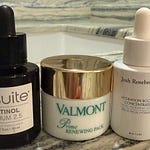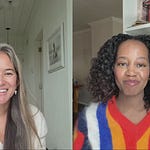It started with a single gray hair (which I obviously plucked.) Then... a few more. A few salon experiments later, I found myself facing a much bigger question than “highlights or lowlights?”
A Small Favor (If You’re Up for It!)
If Voicenotes From A Friend resonates with you, I’d be so grateful if you shared it with someone you think might feel comforted by it too. This project means a lot to me, and your support helps it find its way to the people who need it most. Thank you, truly. You’re the best!!!
In Case You Missed It:
Prefer To Read Instead Of Listen?
Transcript: Gray Hair, Don’t Care (But Also Kinda Do)
Yeah. So at one point, my hair started going gray, and it was at that early stage where you thought you could, like, still pluck out the grays. I don't know if anyone can relate to this phase where you're like, "No, no. If I pluck them out, this won't happen." And then it became very clear very quickly that that was just not going to work. I had a lot of gray. It was coming in fast and furious.
And I, at the time, was highlighting my hair. You know, every—I don't know—six months to a year, because I have kind of brown hair, and I would put some blonder highlights in it because I like the way it looked. And so I was talking to the lovely woman who colors my hair as it was going gray, and we were talking about whether we would double-process to get rid of the grays, or whether we would kind of just blend them.
And we decided, "There are not that many, let's just blend them." If we do the highlights and they're over the gray, or they blend the gray, it's going to read as just kind of more highlights. So we did that for a while, and then as the gray started coming in more and more, we kind of shifted to doing highlights and lowlights.
And there was a point where I looked in the mirror and I said to myself, "Am I letting my hair go gray?" And the answer was, "Ish, yeah. I'm going gray-ish."
The interesting thing is that I think a lot of women have really considered this, and I think in COVID this happened to a lot of women where they weren't coloring their hair, and they allowed their hair to go gray, and they decided to stick with it—for lots of good reasons. You know, a lot of women have a lot of good reasons to go with it.
And interestingly, my reason was not like, "Oh, I'm just going to embrace aging gracefully," or "I'm going to accept aging." I was like, "I like it. I think it looks good, and I kind of dig it." I kind of like how shiny the gray is. I kind of like the texture it brings—it gives my hair a little more volume.
And so this is kind of part of a bigger conversation that I've been having with a lot of women about aging, where there was almost only two choices: You can either fight aging—deny it, you know, try to look younger—or you can kind of accept aging, age gracefully. Like, just accept that aging is going to make you less attractive, but that you should just accept that. You know, fight it or accept it.
And it's so interesting, because in my experience—and I'm 47, so you know, definitely have noticed changes in my looks, in my body, and my hair—but I feel like I'm young. But in my experience, the super interesting thing is it's not really about accepting. I actually see a benefit in it. I'm actually really into it. I actually really like it. Like, I definitely love my 40s, and I think my 50s might be even better.
I love how much it's given me. It's not so much that I'm okay with what it's taken away.
So, for example, my body cannot do what it did when it was 20. You know, I played squash in college and trained really hard, and now when I train really hard, I get really tired. Or, you know, my body just doesn't work the way it used to. And one could see that as something that's been taken away, but I kind of see it as what I've been given, which is an amazing opportunity to stop pushing my body so hard, to really notice what my body needs and what feels healthy for my body.
Because I really, in my 20s and my 30s, worked out way too much. I did way too much because I could. And so now that I can't, it's made me more discerning about what my body really needs and what's healthy for my body and what feels good.
So I never have felt like it's taken something away. It's given me the gift of discernment—in the face of "you can't just get away with mindlessly doing things without intention."
And also with my energy, I cannot push through and do everything for everyone anymore. Again, it feels like, "Oh, that's such a bummer. Don't you wish you could do everything for everyone?" No, I don't. I'm so glad that I can't do everything for everyone anymore, because if I could, I might still be doing it. And instead, I've had to push back and say, "No. I'm one human being with one human body, and I cannot do everything for everyone."
So this aging thing is pretty great.
I noticed also—and I noticed this a while ago—that I was always, you know, pretty. I always got a lot of attention for being pretty. And, you know, pretty privilege is a real thing, and that's a whole other topic I'd love to talk more about. But what I noticed, as I was getting older and I was no longer being, for example, noticed on the street—you know, like, I'm not turning heads on the street. My daughters are now turning heads on the street.
Like, you know, people—youth is beautiful. Youth is beautiful. And older women are beautiful, but it's just a different... it's a different beautiful.
So I'm not being noticed on the street. And what I noticed is this real feeling of, now that that is not where I'm receiving attention, it creates so much more space to expand other parts of me that are valuable and contributing and worthy, and worthy of attention. And when so much of the attention is focused on the looks, it almost crowds everything else out. It's like... It's like too powerful.
Now we can talk so much more about societal norms of beauty and traditional sorts of standards of beauty and how damaging and difficult they could be. But I'm really thinking and focusing on the fact that as I get older, all of these things that seem to be taking something away from me are actually giving me something else—so much more valuable and so much more important.
And so the gray hair, to me, is a little bit of a symbol of that. And it's not like I've accepted it and embraced it despite its inherent lessness than before. I, like, genuinely kind of dig it.
And to be fair, though, I have adjusted around it. In a way like, I used to wear a lot of black, and black doesn't really go that well with my gray hair. So I've adjusted my color palette to the new reality. I've been like, "Oh, this is an interesting opportunity to explore a different color palette for me." And so I wear a lot more light colors, and a lot more—like, I wear a lot of light gray now because it's flattering.
And you know this—I'm vain, like the next girl. You know, I talk to my girlfriends, I'm like, "We're vain." Like, being vain doesn't make you a not-substantial person. Like, yeah, there's an aesthetic thing where I look in the mirror and I'm like, "Oh, this looks nice. Like, that shirt looks good on me. I like the way that looks." And so I've had to adjust my color palette to accommodate the new gray hair.
And I actually think it brings up another topic—which I won't talk about today, but I want to talk about—which is this idea of developing your personal style, of understanding what kind of works in terms of the way you dress and the clothing that you wear and the hairstyle you wear, and how that can be a vehicle to confidence and feeling comfortable in your own skin. Because the clothing is an extension of your skin.
And if you're someone who's like, "I really don't care what clothes I wear, it doesn't matter to me," that's totally cool. I like clothes. I'm into it. I like the way that certain clothes make me feel.
And so yeah, I think I want to talk about—maybe next time—what we can learn through the development of our personal style about what it means and how it feels to feel comfortable in our own skin.
Thank you, as always, for listening. All my love.




